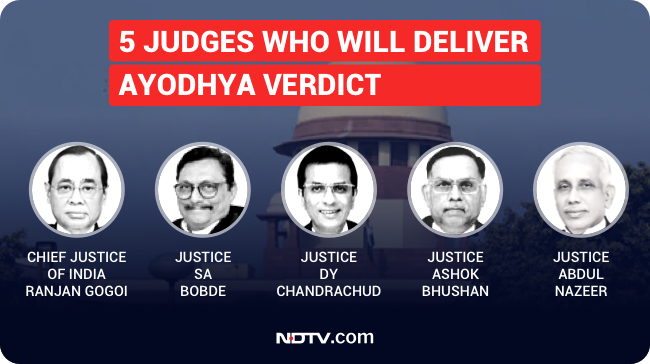Prime Minister Narendra Modi on Saturday addressed the nation over the Supreme Court's Ayodhya verdict, saying there is no space for negativity, bitterness and fear in new India. He also praised the country's judicial system for its "willpower". The disputed 2.77 acre land in Ayodhya will be given to a government-run trust for building a temple and Muslims will be given a five-acre "suitable" plot in the town, the Supreme Court announced today in a landmark verdict in the decades-old land dispute case. A five-judge constitution bench delivered a unanimous verdict.The verdict came almost a decade after the Allahabad High Court had partitioned the disputed site in the ratio of 2:1 between Hindu and Muslim litigants.
Prime Minister Narendra Modi, who is in Punjab's Gurdaspur to inaugurate the Indian side of the Kartarpur corridor, said the Ayodhya verdict will "reaffirm people's faith in judicial process". "The Honourable Supreme Court has given its verdict on the Ayodhya issue. This verdict shouldn't be seen as a win or loss for anybody. Be it Ram Bhakti or Rahim Bhakti, it is imperative that we strengthen the spirit of Rashtra Bhakti. May peace and harmony prevail!" PM Modi tweeted. Home Minister Amit Shah welcomed the judgment and said that the order "will further strengthen India's unity, integrity and great culture".
The Uttar Pradesh Sunni Central Waqf Board has expressed dis-satisfaction with the verdict. "We think it is unjust... We can't consider this justice. We are not criticizing all parts of judgment," said Zafaryab Jilani, the lawyer of the Muslim group. They said they will hold a meeting and take a call on whether a review petition should be filed.
Explaining its decision to grant the disputed site for a temple, the court had said the Archaeological Survey of India has found evidence that the 16th Century mosque of Mughal Emperor Babar was not built on vacant land.
The country has been put on high alert to ensure that no violence breaks out following the verdict. At least 12,000 security personnel have been posted in Uttar Pradesh, where Ayodhya is situated. Prime Minister Narendra Modi, in a series of tweets, said that the "Ayodhya verdict will not be anybody's victory or loss", adding that it was the priority of the country's citizens to maintain harmony.
The security cover of the five judges have also been increased ahead of the Ayodhya verdict. Two helicopters have been kept on standby in Lucknow and Ayodhya to tackle any possible emergency. Security arrangements in Delhi have also been tightened.
The dispute has dominated political discourse since the 1980s. In 1992, rightwing activists tore down the 16th century Babri mosque which they believed was built on the ruins of an ancient temple that marked the birthplace of the Lord Ram. More than 2,000 people were killed in the riots that followed post the incident.
The disputed land -- spanning an area of over 2.77 acres -- in Ayodhya has been claimed by both Hindus and Muslims. While Hindu activists want to build a temple on the site, Muslim groups claim there is no proof that a temple existed there.
The Allahabad High Court in 2010 had prescribed a three-way division of the disputed land but the verdict failed to satisfy the Sunni Waqf Board, the Nirmohi Akhara and Ram Lalla, the parties involved in the dispute. All three moved the Supreme Court.
Here are the LIVE UPDATES on Supreme Court verdict on Ayodhya land dispute case:
 READ HERE: Ayodhya Verdict: After 1,045-Page Ayodhya Verdict, Dinner For Top Court Judges At 5-Star
READ HERE: Ayodhya Verdict: After 1,045-Page Ayodhya Verdict, Dinner For Top Court Judges At 5-StarAfter delivering a landmark verdict on the decades-old Ayodhya temple-mosque dispute, Chief Justice Ranjan Gogoi and his four constitution bench colleagues have planned a lavish dinner at Delhi's luxury Taj Mansingh hotel, sources say.
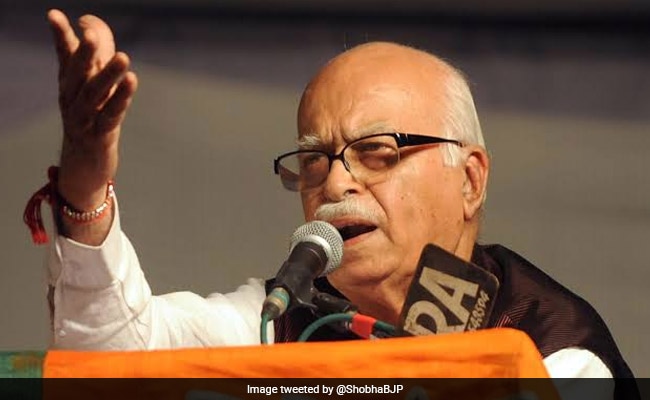 Read Here: "Vindicated And Blessed," Says BJP Veteran LK Advani On Ayodhya Verdict
Read Here: "Vindicated And Blessed," Says BJP Veteran LK Advani On Ayodhya VerdictBJP veteran LK Advani, who turned the sporadic demands for a Ram temple at Ayodhya into a mass movement from the late 1980s, today welcomed the Supreme Court's landmark verdict, saying he stands "vindicated". The court has awarded the disputed 2.77 acres of land to Ram Lalla, the infant Lord Ram who is a respondent in the case, for a temple and an alternate five-acre site at a prominent spot in Ayodhya for a mosque.
"The unanimous decision taken by the panel of esteemed judges must be respected. I request all to maintain peace and harmony.#AyodhaVerdict," tweeted Mr Naidu.
The Supreme Court on Saturday directed the Centre to give five acres of suitable land to the Sunni Waqf Board and at the same time make necessary arrangements for the construction of the temple by forming a trust.
Speaking to reporters after the top court verdict clearing the way for the construction of the Ram temple at the disputed site in Ayodhya, Patel congratulated the ASI team which prepared the report.
"The ASI report which till now was the property of the court will soon be published in the form of a book for the public," he said.
"I am grateful to all the experts who worked on the report and also congratulate them for their efforts," he added.
Speaking to ANI, Mr Joshi said that keeping in mind the traditions of India, every citizen should respect the decision and maintain peace for their own good.
"A lot of emotions are attached to the case. Now that the court has given its verdict, everyone should accept it and move ahead for the growth of our country," he added.
NCP chief Sharad Pawar said the top court's unanimous decision will help address a "serious concern" before the country.
"The Supreme Court's unanimous decision will help address a serious concern before the country. The judiciary has talked about protecting interests of all the sections of the society. It is a good thing," Mr Pawar told reporters.
"I urge all the people of the country that an important, landmark judgement has been given. All sections of the society should welcome and respect it," the NCP chief said and urged people to ensure peace and harmony.
On some BJP leaders visiting Ram temple after the verdict, Mr Pawar said it is an individual's right and choice whether to visit a temple or Masjid.
"There is no need to comment on it as it is not a political issue," he added.
"I welcome the verdict of the Supreme Court. It will strengthen our country''s multilingual, inter-religious harmony. This verdict is going to solidify the general public''s belief in the justice system," he was quoted as saying by ANI.
"This verdict is not a victory or defeat for anyone. I thank the people of Maharashtra for accepting the verdict and maintaining peace, law and order in the state," added Mr Fadnavis.
"For the future also, my request is that all religions and communities should readily accept this outcome. Everyone should contribute to maintaining peace and harmony. It is time to strengthen national unity and integrity," he said.
Welcoming the unanimous decision of the five-judge top court bench, Nadda said the judgment was an example of inclusive views representing all sections of the society.
"The Bharatiya Janata Party welcomes and salutes the people of the country who have united and kept the social, cultural and spiritual fabric of the country intact. This decision has given a clear message that we are united and the roots of democracy in India are very strong," Mr Nadda said in a statement, reported PTI.
"Jo faisley faslon ko ghatatey hain, woh insaan ko behtar insaan banate hain (The decisions which bridge the gap, makes people better human beings," Mr Yadav tweeted in Hindi.
The Samajwadi Party leader's comments assume significance as it was his father and then chief minister Mulayam Singh Yadav who had ordered the Uttar Pradesh police to open fire at karsevaks gathered in Ayodhya on October 30, 1990, reported news agency PTI.
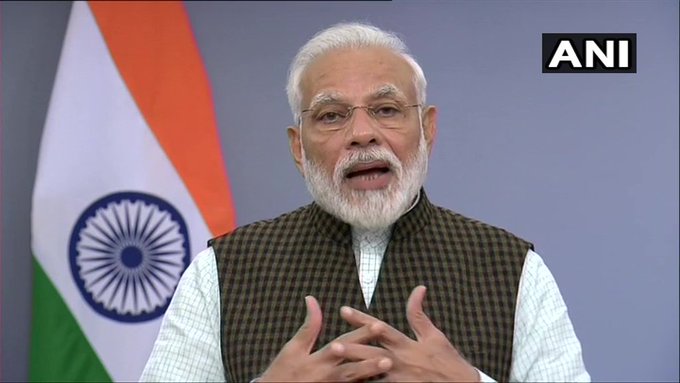
This is a golden chapter in the history of Indian judicial system. In this matter, the court listened to the arguments of all the parties, and gave a unanimous judgement: PM Modi
The world now knows India's democracy is robust: PM Modi
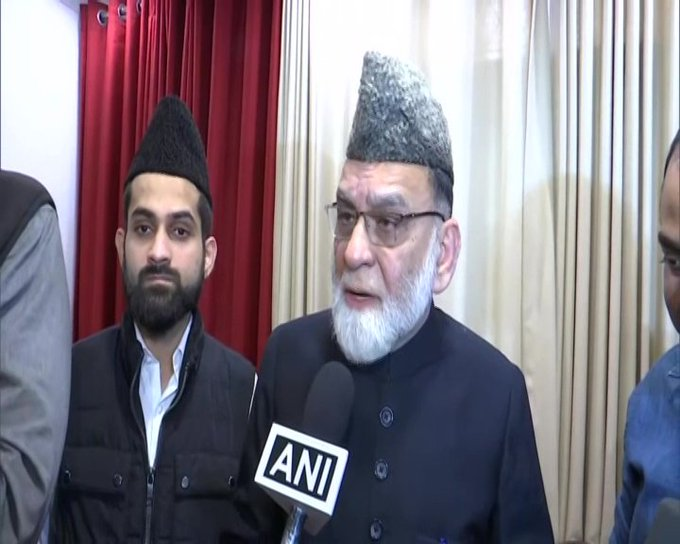
Uttar Pradesh remained peaceful following the Supreme Court judgement in the Ayodhya land title dispute case, a senior police officer has said.
"There is no report of any untoward incident from anywhere in the state. We are keeping a close watch (on the law and order situation). Our team is on the job," UP Director General of Police OP Singh told PTI.
Rajasthan Chief Minister Ashok Gehlot said the Supreme Court judgement in the Ayodhya case should be respected by all and harmony and peace should be maintained.
"The day of judgment came after a long wait. Everyone should respect the decision by maintaining peace and harmony," he was quoted by news agency PTI as saying.
"We have made all arrangements to deal with any situation or anti-social elements who try to create any disturbance," he added.
I thank the Supreme Court. Today the debate is over. I thank people of all religions as everyone has accepted the verdict: Uddhav Thackeray
The Supreme Court has given the final verdict today. Me and my party respect the decision. Hope all political parties and religious institutions honor the decision: Nationalist Congress Party Chief Sharad Pawar
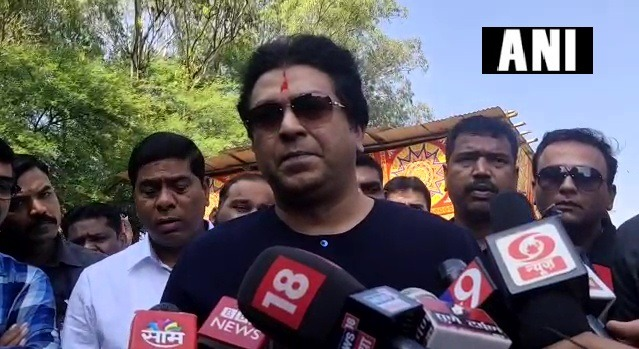
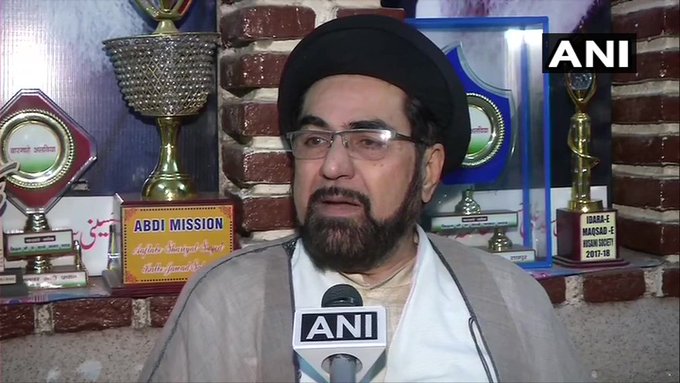
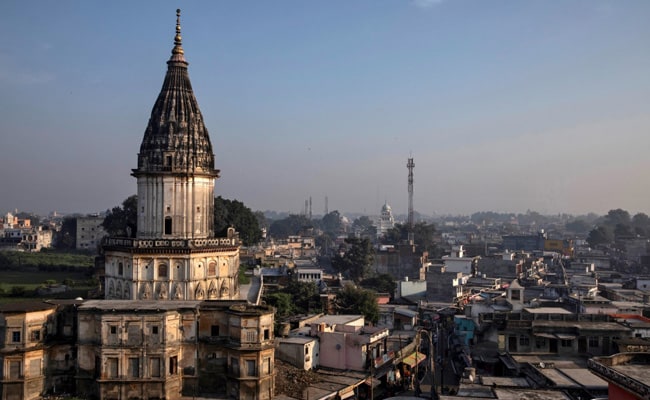 #AYODHYAVERDICT Top Twitter Trend Worldwide
#AYODHYAVERDICT Top Twitter Trend Worldwide- Basing its verdict on the report filed by the Archaeological Survey of India (ASI), the Supreme Court said the land dispute at the heart of the case should be decided on evidence. "Title cannot be established based on faith and belief. Whether a belief is justified is beyond judicial inquiry. Once a faith is established, courts should defer to it," the court said, adding that it should "preserve balance".
- The ASI report noted that an older structure existed below the disputed building but it did not say if it (the disputed building) had been constructed after demolishing the older structure. Referring to the report the court said the underlying structure was not Islamic.
- The court said that as per documentary evidence prior to 1857 there was no exclusion of Hindus from worshipping at the site. The outer courtyard became a focal point of worship by Hindus, for which they have been able to establish unimpeded possession, the court added.
- Muslims have not brought evidence to show possession, the court said. Noting that the inner courtyard was the contested site, the court also said evidence does not indicate it was abandoned by the Muslims. There is also no evidence to show the offer of namaz by Muslims was to the exclusion of Hindus, it added
- The Supreme Court also said that Muslims had been wrongly deprived of a mosque which had been constructed well over 450 years ago.
- In its written verdict the court said justice would not prevail if it were to overlook the fact the mosque had been lost through means that cannot be employed in a secular nation committed to the rule of law.
- On the demolition of the Babri Masjid, the court said it was "...a calculated act of destroying a place of public worship" and said "...it is necessary to provide restitution to the Muslim community for the unlawful destruction of their place of worship".
- In deciding some of the other petitions, the court ruled that Ram Janmbhoomi was not a juristic person and that the Nirmohi Akhara's suit was barred by limitation.
- The court's ruling that the 2.77 acres is to be handed over to a government-run trust to build a temple is contingent on the maintained of peace in Ayodhya, the court ruled. The government has been tasked with keeping law and order.
- The court recalled the ruling of the Allahabad High Court in which a three-way division of the land was ordered but said a similar decision today was legally unsustainable. "(This) is not feasible. Dividing the land will not sub serve interest of either of the parties or secure a lasting sense of peace and tranquillity," it said.
Syed Zainul Abedin, Ajmer Sharif dargah dewan on Ayodhya verdict: This is nobody's victory or defeat. We should accept the verdict of the Supreme Court. Whatever has happened, is in the interest of the nation and we should put an end to the dispute right here. pic.twitter.com/O2gp9tPjk6
- ANI (@ANI) November 9, 2019
 Full Text: Supreme Court Judgement In Ayodhya Case
Full Text: Supreme Court Judgement In Ayodhya CaseRSS chief Mohan Bhagwat addresses media on #AyodhyaVerdict
- NDTV (@ndtv) November 9, 2019
Watch LIVE: https://t.co/hMlRpgrUU6 and NDTV 24x7 https://t.co/Po9GJhObxP
#AyodhyaVerdict out. NDTV gets you the latest from #Ayodhya city. pic.twitter.com/UcOqHoqv20
- NDTV (@ndtv) November 9, 2019
 Ayodhya Verdict: Politicians Appeal For Peace After Big Ayodhya Verdict
Ayodhya Verdict: Politicians Appeal For Peace After Big Ayodhya Verdict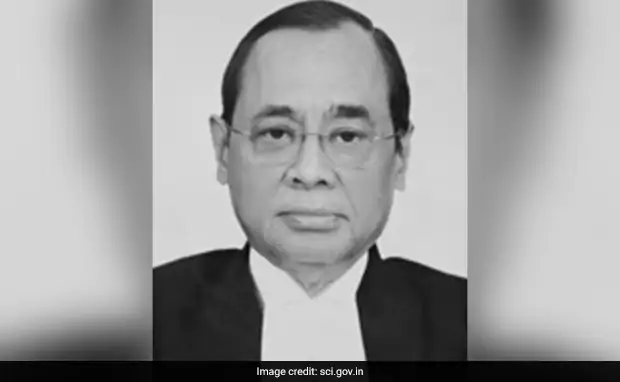
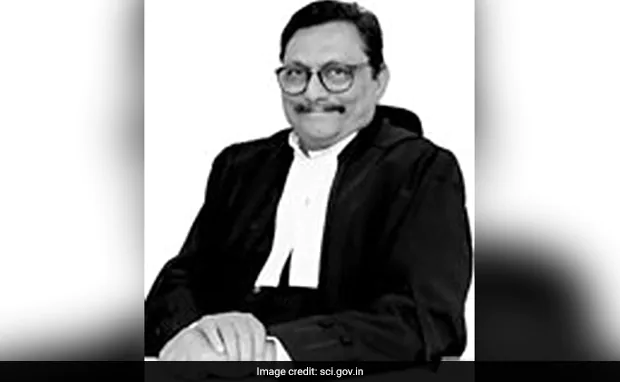
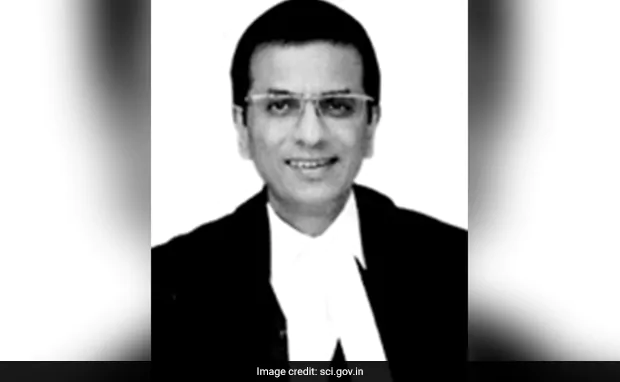
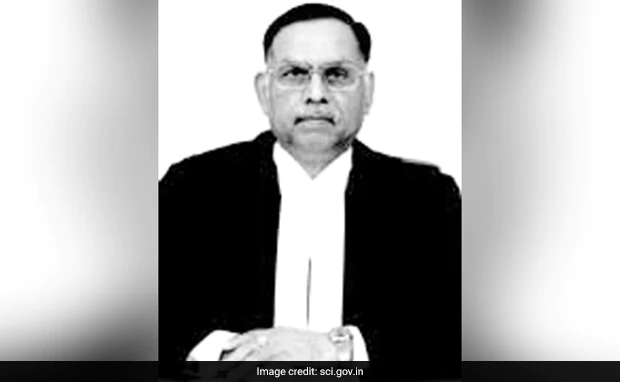
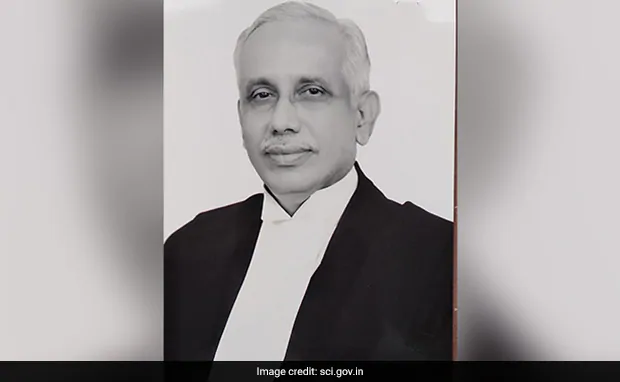
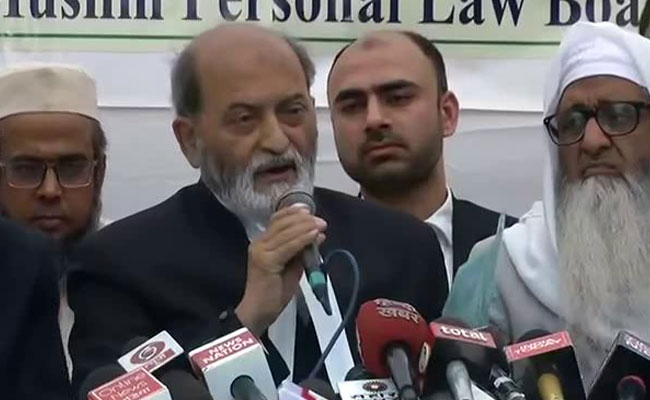
#BreakingNews | Union Defence Minister Rajnath Singh says, "#AyodhyaVerdict is a historic...appeal to all to maintain peace and harmony."
- NDTV (@ndtv) November 9, 2019
Read here: https://t.co/c27a44ngnw pic.twitter.com/ZZy3Dvd4g2
"Everyone should respect the verdict and maintain peace and harmony": Union Minister Nitin Gadkari #AyodhyaVerdict pic.twitter.com/V000FzjD8U
- NDTV (@ndtv) November 9, 2019
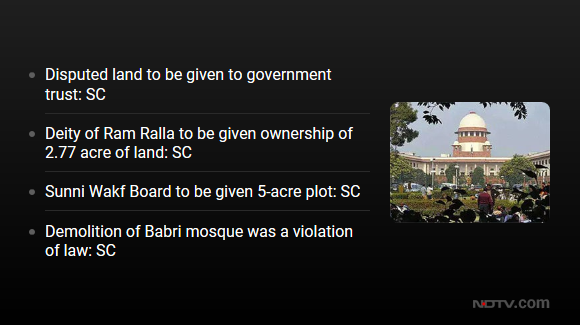
#AyodhyaVerdict | "Disputed land to be given to Hindus, trust to be formed by the government for temple construction in 3 months": Supreme Court pic.twitter.com/Le5fQCvE4t
- NDTV (@ndtv) November 9, 2019
- The disputed structure was not built on vacant land according to ASI
- Evidence has been presented that Hindus have been offering prayers at the outer courtyard
- Claim of Sunnis is that namaz were being offered at Babri mosque till destruction
- There was a consistent pattern of worship by Hindus in the outer courtyard
- Setting up a railing inside was done to ensure peaceful worship by both religions
#AyodhyaVerdict being read out by Supreme Court judges.
- NDTV (@ndtv) November 9, 2019
LIVE coverage on https://t.co/hMlRpgrUU6 and NDTV 24x7
https://t.co/eqqLvaFakY
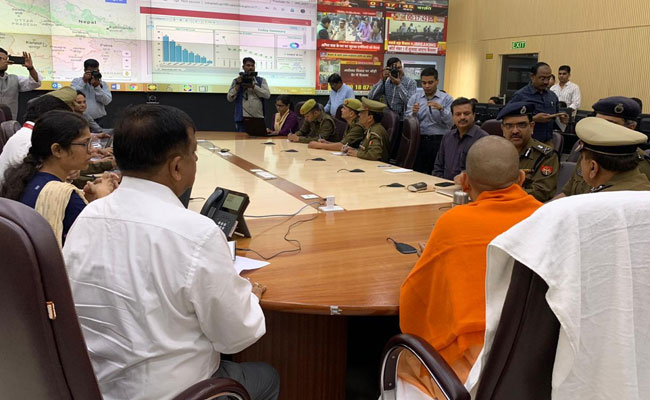
5-judge bench of the Supreme Court to deliver #AyodhyaVerdict shortly. NDTV reports from Ayodhya. pic.twitter.com/SNZ57E4OEX
- NDTV (@ndtv) November 9, 2019
#AyodhyaVerdict | "Devotees are visiting the temple of Shri Ram Lalla. There are no restrictions on visiting the temple. All markets are open, the situation is completely normal": Ashutosh Pandey, ADG (Prosecution) UP Police, in #Ayodhya.
- NDTV (@ndtv) November 9, 2019
Live updates: https://t.co/6Gpi527l3Z pic.twitter.com/ex6hwPawXL
UP launches WhatsApp helpline number for receiving complaints regarding provocative messages: 8874327341
- Prasar Bharati News Services (@PBNS_India) November 9, 2019


- The Babri Masjid was built in Ayodhya in 1528. Hindu groups claim it was built after demolishing a temple. In 1853, the first recorded communal clashes over the site took place. In 1859, the British administration put a fence around the site marking separate areas of worship for Hindus and Muslims, and it stood that way for nearly 90 years. The property dispute went to court for the first time in 1949 after idols of Lord Ram were placed inside the mosque.
- In 1984, Hindu groups formed a committee to spearhead the construction of a Ram temple. Three years later, a district court ordered the gates of the mosque to be opened after almost five decades and allowed Hindus to worship inside the "disputed structure." A Babri Mosque Action Committee was formed by Muslim groups. In 1989, foundations of a temple were laid on land adjacent to the "disputed structure".
- In 1990, the then BJP president LK Advani took out a cross-country rath yatra to garner support to build a Ram temple at the site. VHP volunteers partially damaged the Babri mosque.
- On December 6, 1992, the mosque was demolished by Hindu activists. Communal riots across India followed. Ten days after the demolition, the Liberhan Commission was set to probe the incident. The Commission submitted its report on June 2009 - naming LK Advani, Atal Bihari Vajpayee and other BJP leaders - almost 17 years after it began its inquiry.
- In September 2003, a court ruled that seven Hindu leaders, including some prominent BJP leaders, should stand trial for inciting the destruction of the Babri Mosque. But no charges were brought against Mr Advani who was then the Deputy Prime Minister. A year later, an Uttar Pradesh court ruled that the order which exonerated him should be reviewed.
- The case against the BJP leaders, including Murli Manohar Joshi and Uma Bharti as well, is being heard by a trial court in Lucknow. In July this year, the Supreme Court extended the tenure of the judge hearing the case and set a nine-month deadline for the verdict.
- In April 2002, a 3-judge Lucknow bench of the Allahabad High Court began hearings on determining who owned the site. In September 2010, the Allahabad High Court pronounced the verdict. The verdict said the site of Babri mosque is to be divided into three parts, each going to Nirmohi Akhara, Ram Lalla and the Sunni Central Waqf Board of Uttar Pradesh. Within months, Hindu groups and Muslim groups moved Supreme Court challenging the High Court verdict.
- In 2011, the Supreme Court stayed the Allahabad High Court order. Not long before, the top court had said the Allahabad High Court verdict was strange and surprising.
- After mediation proceedings by a Supreme Court-appointed three-member team failed to find an amicable solution to the dispute earlier this year, a five-judge constitution bench began day-to-day hearings on August 6.
- The daily hearings at the Supreme Court came to an end after 40 days on October 16. The verdict was reserved and set to be declared before November 17, when Chief Justice Ranjan Gogoi, who is leading the five-judge constitution bench hearing the case, is slated to retire.
Tight security outside the residence of Chief Justice of India Ranjan Gogoi in Delhi, ahead of #AyodhyaVerdict
- NDTV (@ndtv) November 9, 2019
(📸credit: ANI) pic.twitter.com/gxnO5zlwNQ







